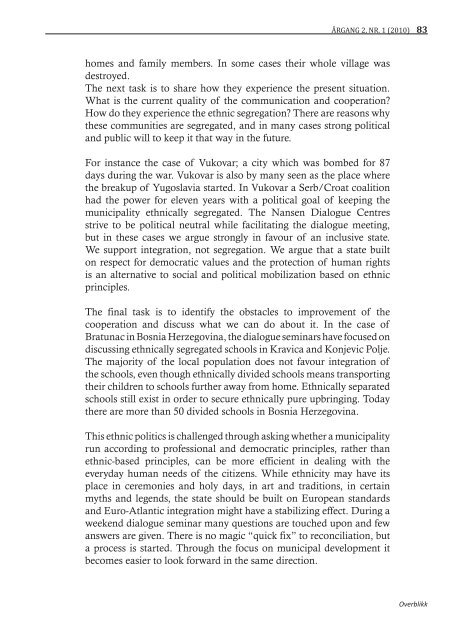Utgave - Etter Lemkin
Utgave - Etter Lemkin
Utgave - Etter Lemkin
You also want an ePaper? Increase the reach of your titles
YUMPU automatically turns print PDFs into web optimized ePapers that Google loves.
ÅRGANG 2, NR. 1 (2010) 83<br />
homes and family members. In some cases their whole village was<br />
destroyed.<br />
The next task is to share how they experience the present situation.<br />
What is the current quality of the communication and cooperation?<br />
How do they experience the ethnic segregation? There are reasons why<br />
these communities are segregated, and in many cases strong political<br />
and public will to keep it that way in the future.<br />
For instance the case of Vukovar; a city which was bombed for 87<br />
days during the war. Vukovar is also by many seen as the place where<br />
the breakup of Yugoslavia started. In Vukovar a Serb/Croat coalition<br />
had the power for eleven years with a political goal of keeping the<br />
municipality ethnically segregated. The Nansen Dialogue Centres<br />
strive to be political neutral while facilitating the dialogue meeting,<br />
but in these cases we argue strongly in favour of an inclusive state.<br />
We support integration, not segregation. We argue that a state built<br />
on respect for democratic values and the protection of human rights<br />
is an alternative to social and political mobilization based on ethnic<br />
principles.<br />
The final task is to identify the obstacles to improvement of the<br />
cooperation and discuss what we can do about it. In the case of<br />
Bratunac in Bosnia Herzegovina, the dialogue seminars have focused on<br />
discussing ethnically segregated schools in Kravica and Konjevic Polje.<br />
The majority of the local population does not favour integration of<br />
the schools, even though ethnically divided schools means transporting<br />
their children to schools further away from home. Ethnically separated<br />
schools still exist in order to secure ethnically pure upbringing. Today<br />
there are more than 50 divided schools in Bosnia Herzegovina.<br />
This ethnic politics is challenged through asking whether a municipality<br />
run according to professional and democratic principles, rather than<br />
ethnic-based principles, can be more efficient in dealing with the<br />
everyday human needs of the citizens. While ethnicity may have its<br />
place in ceremonies and holy days, in art and traditions, in certain<br />
myths and legends, the state should be built on European standards<br />
and Euro-Atlantic integration might have a stabilizing effect. During a<br />
weekend dialogue seminar many questions are touched upon and few<br />
answers are given. There is no magic “quick fix” to reconciliation, but<br />
a process is started. Through the focus on municipal development it<br />
becomes easier to look forward in the same direction.<br />
Overblikk


